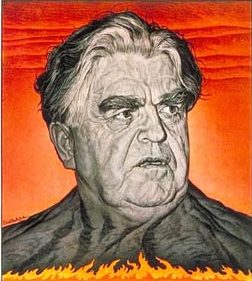By Saul D. Alinsky, taken f rom the introduction to: Alinsky, S. D. (1970). John L. Lewis, an unauthorized biography. New York, Vintage Books. Pages ix-xiv
rom the introduction to: Alinsky, S. D. (1970). John L. Lewis, an unauthorized biography. New York, Vintage Books. Pages ix-xiv
This is the story of a man, of a revolution and how he led it.
It is relevant to our own revolutionary times. All great social crises turn on certain common concepts. One is that progress occurs only in response to threats, and reconciliation only results when one side gets the power and the other side gets reconciled to it. Another is that the power of organised people is required to defeat the power of the establishment and its money. A third is that effective tactics means going outside the experience of the enemy, and a fourth is that all issues must be polarised. These and other revolutionary concepts hold true through all the revolutions of man, no matter in what place or time.


 A few weeks ago
A few weeks ago